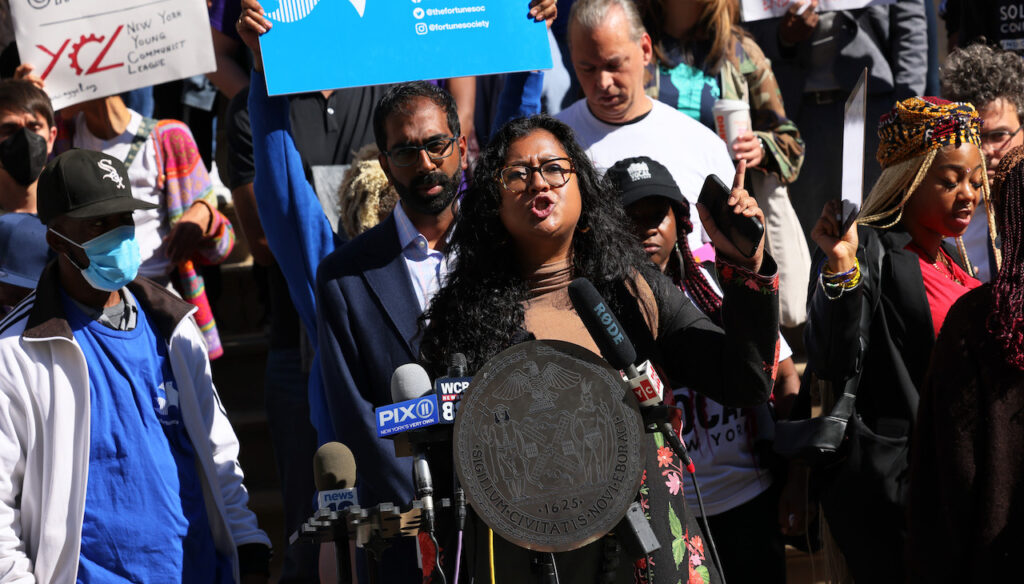In December 2019, Alma Castillo’s family celebrated a loved one’s birthday while she worked a shift as an essential worker.
Hours into the gathering, her son, Javier Castillo, was apprehended by Immigration and Customs Enforcement, or ICE, without heed or warning, forcing Alma to abandon her shift and desperately seek assistance at 3 a.m.
Alma told the story of how she met with private immigration attorneys who allegedly took advantage of her emotional state and sought to charge her thousands to provide initial assistance in trying to locate her son.
Fourteen months later, an investigation found that a police officer had incorrectly tipped off Javier to ICE, and officials wrote off the arrest as an “operational error.”
Alma’s testimony to New York City Council was one of many underreported instances of ICE apprehensions as a result of tips and collabs between the city’s law enforcement officials with federal agents, and the city is taking up legislation to close those loopholes.
“I know more people in our community have immigrant stories,” said Alma as she closed her testimony.
On Wednesday, Feb. 15, the Committee on Immigration, chaired by city councilmember Shahana Manif, heard testimonies from immigrants residing in New York to forward three measures that would strengthen standing immigration laws, as well as impose limitations on police cooperation with the feds.
Bill 185, introduced by Councilmember Keith Powers, would “prohibit the Department of Correction from communicating with federal immigration authorities.”
Bill 184, also introduced by Councilmember Powers, seeks to “prohibit the police department from detaining an individual” unless a judge signs a warrant for the individual’s arrest.
New York City positions itself as a proud sanctuary city for immigrants, and as recently as last year, Mayor Eric Adams could be seen welcoming busloads of immigrants sent by Texas Governor Greg Abbot.
In 2017, the city stood against former Republican President Donald Trump’s messaging on immigration and enacted municipal law that restricted the use of city resources for the purposes of assisting federal immigration officials.
“While the federal government is looking to tear families apart, we in New York City are saying NO,” said Councilmember Rafael Espinal in a 2017 statement.
Law enforcement officials in New York cannot enter into agreements with federal officials through program 287 (g), which “deputizes” local police to conduct duties relating to ICE on behalf of the federal government.
Previous legislation, however, left gaps for officials to work internally when processing immigrants, often without their knowledge, eventually leading to deportation. City Council is now trying to fill those.
Daniel López, a Mexican immigrant, was approached by ICE in his residence in 2020, but he refused to open the door for fear of his safety. He called the police, who, upon arrival, told López it was safe to come out.
ICE then arrested López and deported him to Mexico. He testified before city council, and said he thought police officers didn’t cooperate with ICE.
Trapped in the system
In another case, Aleksy Raspoutny, a Ukrainian man who has resided in New York since he was a teenager. Raspoutny, in late 2022, appeared before a court for a routine hearing regarding a misdemeanor case, for which the judge ordered he stay at Rikers Island for a week until the next hearing could be held.
Instead, the Department of Corrections handed Raspoutny over to federal immigration officials, who placed him in a Pennsylvania detention center without warning.
Raspoutny told his current attorney, Meghna Phillip — a Public Defender at Neighborhood Defender Service — that after the NYDOC took his fingerprints and processed his paperwork, they proceeded to mount him in a van with no indication of where he would be taken.
Given the open space in existing law, neither Castillo, López, or Raspoutney can seek legal redress.
A third measure, Bill 158, would create a private right of action, allowing individuals held by authorities “to bring an action alleging a violation of the detainer laws in any court of competent jurisdiction.”
Councilmember Shahana Hanifa is the bill’s author.
“A right without the ability to enforce it is no right at all,” said Phillip during a rally held by immigration rights groups ahead of the city council hearing.
Phillip went on to stress that the issue is current, and actively happening as city council considers new legislation.
Source : AL DIA News


